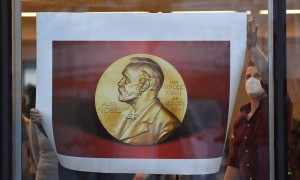The May Day holiday will see many Chinese mainland residents, bitten by the travel bug, spending time away from home. While most of them will travel within the mainland, a large number will head overseas. We can thus expect yet another slew of micro-blogging reports on Chinese tourists behaving badly outside the mainland.
Recent additions to the mainland outbound tourist behavior "hall of shame" include faking marriage certificates to get honeymoon discounts in the Maldives, letting children defecate on the floor of a Taiwan airport, and throwing candies at tiny tots in the Democratic People's Republic of Korea.
These conducts reflect the explosive growth in Chinese outbound travel in recent years. Some 98 million Chinese tourists traveled abroad last year, up 14 million from 2012 and well above the 29 million who traveled abroad in 2004. It's highly likely that the majority of these people had not been abroad before.
In an article in South China Morning Post on June 1, 2013, Yong Chen, a researcher in tourism with Hong Kong Polytechnic University, said that most "bad" tourists don't intend to be "bad"; they simply act as they normally do in China. Acts like spitting in pubic, haggling over prices of goods (even when prices are non-negotiable), posing for photographs in roped-off flower beds or talking loudly in restaurants that may be tolerated in China, but they are not appreciated in many foreign countries.
In a May 30, 2013, Reuters article, Liu Simin of the Tourism Research Center at the Chinese Academy of the Social Sciences went further, saying: "Objectively speaking, our tourists have relatively low civilized characters." Concern over this problem has prompted the Chinese government, which wants to protect the country's image and project its "soft power", to issue guidelines for the conduct of Chinese traveling overseas.
Although there is no shortage of anecdotes of Chinese tourists' boorish behavior, hard numbers to back the sweeping generalization made by Liu are difficult to come by. Furthermore, while the admittedly substantial numbers of Chinese who behave outrageously abroad grab all the attention, their well-behaved compatriots pass under the radar screen. China may have more than its share of culturally insensitive, ill-behaved tourists, but a majority of outbound Chinese travelers, especially those who have been abroad before, probably do not cause problems.
People in foreign countries may kvetch about their Chinese guests, but they are more than happy to receive their money. According to data released by CASS earlier this year, Chinese tourists spent $102 billion in 2012, putting them ahead of the previous world leaders, the Americans and Germans. And a 2013 survey indicates that 48 percent of the Chinese tourists traveled abroad for shopping, mainly to buy luxury goods that could cost up to 60 percent more in China.
The survey further indicates that the bulk of the luxury purchases were made by the wealthiest 26 percent of Chinese travelers, which should be of greater concern to the Chinese government than the loutish conduct of some Chinese outbound tourists. Foreign travel, it would seem, mirrors the growth of inequality and conspicuous consumption by the wealthy in China. Liu is on more solid ground when asserting, "Overseas travel is a new luxury, Chinese who can afford it compete with each other and want to show off." This behavior has fuelled resentment against the wealthy in China, and it is a key factor driving the recent government crackdown on corruption.
But as China's middle class expands and foreign travel becomes less and less the preserve of Chinese jet setters, this is beginning to change. Two Chinese friends, for example, eschewed group package tours while going abroad on their honeymoons, choosing instead to arrange their own tour itineraries. They did so to spend more time appreciating the sights and cultures of their foreign destinations - one of them got ripped off by an unscrupulous car rental agency - and avoid the mandatory shopping stops that are standard in group deals.
These individuals point to an emerging breed of Chinese overseas travelers: young and better educated with a greater knowledge of foreign places and cultures, and the eagerness to learn more about them. With more tourists like them, perhaps the image of the "ugly Chinese" tourist will fade into memory in the future, and outbound travelers from China will become respected ambassadors of a country with a long history and glorious culture.







